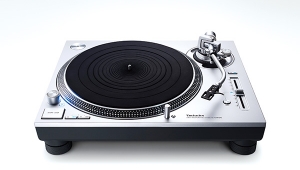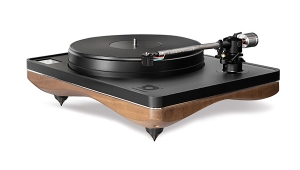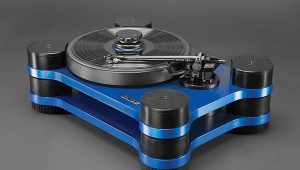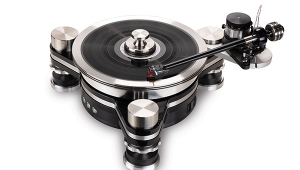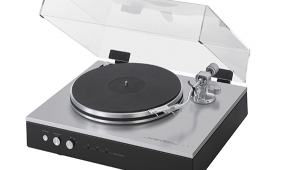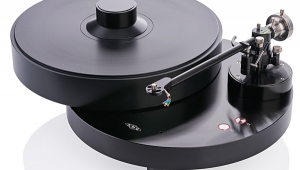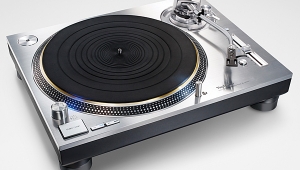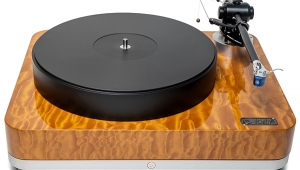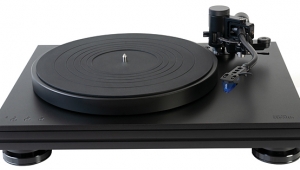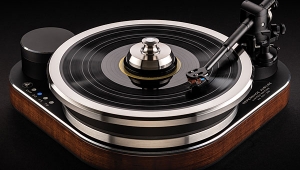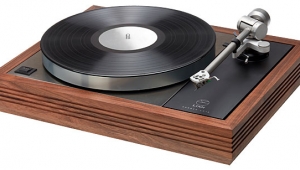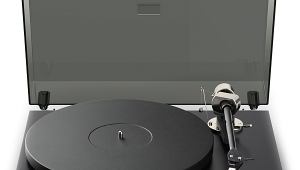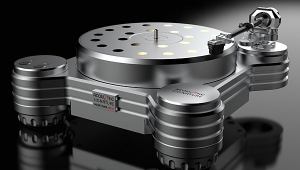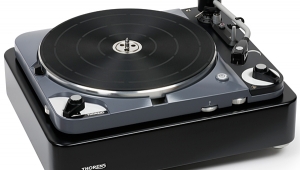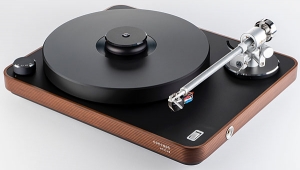| Columns Retired Columns & Blogs |
Linn Sondek LP12 turntable & Klyde phono cartridge Page 4
The Basik LP12 most closely resembles the Linn's original incarnation. The motor, a 60Hz synchronous AC job not that much different from what used to come in the AR turntable, is plugged directly into the wall AC. The Basik's motor—and thus its belt, platter, arm, cartridge, and eventually the speaker cones—has to deal directly with frequency jitter and other hash riding on the never-clean, never-precise AC line. The soft belt supplies a measure of low-pass filtering to reduce the effects of all the junk on the AC, but some of it still manages to get through to affect the platter's moment-to-moment speed.
The Valhalla upgrade was introduced by Linn to address the shortcomings of the original motor scheme. The Valhalla synthesizes a much purer AC waveform with which to drive the motor, thus dramatically cleaning up and steadying its rotation.
The Lingo, introduced a few years ago, was Linn's way of putting on a Doc Marten and stomping down on the problem of motor control (before, they'd slipped on a sandal and tapped lightly). The Lingo can be thought of as an electronic speed control for the LP12—it synthesizes its own ultra low-jitter 50Hz AC signal and supplies enough current to lock the turntable's motor DOWN.
Listening: the 3 faces of Linn
Listening to the LP12 in Basik form, the overall character was full, robust, and satisfying. There was a considerable amount of midbass fatness to the sound, which is no news to long-time followers of the Linn Saga—this low-end "spare tire" is why Linn came up with the Valhalla and, later, the Lingo and Cirkus. The Basik's roly-poly bottom wasn't really a detriment to the music, but it did fatten things up right in the region where bass lines either propel the music forward in a muscular fashion or slow it down like a fat guy trying to run a race. The Basik LP12 was definitely a smiling, jolly Pillsbury Doughboy.
After Steve Daniels installed the Valhalla supply and the 50Hz motor, we put on Stevie Ray Vaughan's Couldn't Stand the Weather and my mouth opened into an "O". What had been kind of a cool, tubby roar in the key of E-flat over the Basik was now a highly detailed, fast-riffing Fender Jazz in the hands of Tommy Shannon. This was the kind of demonstration I wished I could give to every objectivist who ever told me that turntables don't make as big a difference as cartridges. In short, the bass bloat I'd heard from the LP12 Basik was significantly reduced by the addition of the Valhalla supply, and the entire bass range made huge gains in extension, speed, and articulation. There was also a general sense of a "cleaning-up" of the sound across the rest of the spectrum, with a clearer and more focused sound throughout the midrange and highs. Recorded ambience and other low-level details were much more audibly distinct than with the Basik version of the LP12, giving the Valhalla version a much more detailed and transparent sound than the entry-level LP12.
Then we plugged in the Lingo supply.
The following is a carefully restrained assessment of the Lingo supply's effect on the sound of the LP12 turntable:
MAN!!! MAN O MAN!!! HOO HAW!!! HAHAHAHAHAHAHAHAHAHAHAHAHAHAHAHAHAHAHAHAHA HAHAHAHAHAHAHAHAHAHAHAHAHAHAHAHAHAHAHAHAHA HAHAHAHAHAHAHAHAHAHAHAHAHAHAHAH!!!!!
I'm not funnin' you. If the difference between the Basik and Valhalla versions was this much, the difference between the Valhalla and the Lingo was THIIIIIIIIIIIIIIIIIIIIS much. I sound like a 12-year-old boy who just discovered what his right hand is for, but you just have to hear the Valhalla/Lingo comparison for yourself—back to back, if possible. If anything, JA's wildly enthusiastic review—"Go and buy the Lingo right now!"—was a carefully restrained assessment. The Lingo ROCKS.
As JA said, bass extension went down at least another octave. The Lingo took the entire "cleaning-up" effect of the Valhalla supply and increased the contrast at least twofold, as well. But it was the unbelievable tightening-up of the whole bass range and effortless power which the Lingo endowed the LP12 with that freaked me out the most. The LP12 Valhalla is no fallguy when it comes to deep, tight bass, but the Lingo'd Linn is a whole 'nother ballgame. The more I listened to familiar LPs with the Lingo supply powering the LP12, the more dirty looks I cast at my trusty Well-Tempered Record Player, which just shrugged its tonearm and sighed, "Look, you ain't exactly Jan-Michael Vincent, either."
Cirkus or vargas?
Toward the end of the review period, Audiophile Systems had the review sample of the LP12 fitted with their new $495 Cirkus upgrade (see JA's review last month). The Cirkus isn't another power-supply upgrade, but a beefier spindle/bearing/sleeve assembly for the platter, along with some associated parts to swap out in the subchassis suspension.
I have to say that, while I did hear an improvement in the sound of the LP12 after the Cirkus was installed, it was not the kind of jaw-dropping, Sansabelt-soiling transformation that the Lingo provided. The Cirkus does indeed give the LP12 a significant increase in detail and transparency, but the general character of the 'table doesn't change as dramatically as with the Lingo.
The Cirkus even effected one improvement to the LP12 that, I have to admit, I kinda liked better unimproved. Even with the Lingo supply, the LP12 has a narrow range in the midbass that remains somewhat emphasized. Not bloated or slow—just emphasized. Some have speculated that this is due to cabinet resonances in the LP12's hollow wooden base; others have said that it's the Linn which gets the midbass right, and the rest a' ye kin goo STUFF I'!!
Well, the Cirkus completely eliminated this li'l quirk of the LP12. After the Cirkus is installed, it's just gone; in its place is a world of detail and information in the low end which even the Lingo by itself doesn't reveal.
Maybe I shouldn't be saying this, but I really liked that li'l bass thang that the pre-Cirkus LP12 did. I know, I know, I'm supposed to be an unthinking, unfeeling soldier in my quest for absolute neutrality and accuracy in the reproduction of music, but dang-nabbitt, Willie Weeks won't sit his fatback butt down in the middle of my listening room and WHOMP me any more. Now whenever I put on Donny Hathaway Live, he just shows off all these fast new bass licks he never used to play on this record before the Cirkus was installed in the LP12.
Super'tables
If I could own any turntable on the market, it would be the Linn LP12. I've heard various other super-'tables better in narrow areas of performance, but none offers the combination of sound quality, freedom from constant futzing, and just plain good ol' soul of the Linn. You can get into the game and get a big fat chunk of this soul with the LP12 Basik for a very reasonable price, bite off an even bigger chunk with the Valhalla version, or go all the way and treat yourself to the awe-inspiring, fully loaded Lingo version. Either way, you're going to be playing a lot more records and smiling a lot more smiles than you used to.
With the Ekos arm, Lingo power supply, and, yes, even the Cirkus upgrade, the LP12 ranks as one of the finest high-end audio products on the market today. I'm saving my money as we speak, because, sooner or later, I am going to buy one.
- Log in or register to post comments
